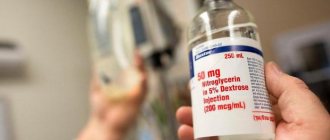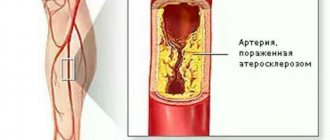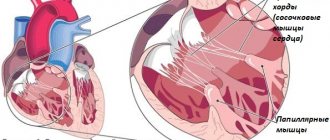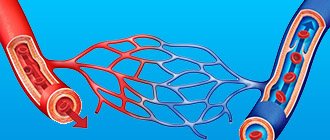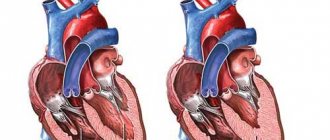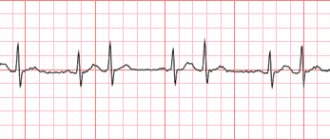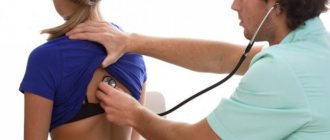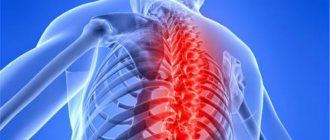The relationship between the brain and heart rhythms has been supported by decades of research. Many famous scientists claim that the human autonomic nervous system, when activated, can change the rhythm of the heartbeat.
To the logical question: can arrhythmia be caused by nerves, there is one answer. Yes, the pathology that arose for this reason is a common occurrence in modern life.
Factors of the psychosomatic nature of changes in heart rhythms arising from disturbances in the emotional background are closely interrelated. The appearance of pathology can be caused by frequent stress, instability in life, and instability of mental state. If a person is diagnosed with arrhythmia that has developed due to nervousness, the root causes of this condition should be found and get rid of it.
Treatment of heart rhythm disturbances according to psychosomatics.
First, you need to understand that there is a reason.
And this reason lies in your emotional background. And it is usually associated with an emotion such as fear. If you are aware of this, you will be able to think differently about heart rhythm disturbances in the future.
Therefore, knowing that you have psychosomatics, you should begin treatment in this proven way:
1 - be well examined for physiological disorders and do not ignore this issue. Be sure to visit a doctor;
2 - but stable improvement and recovery will begin when you constantly work with your emotions;
What are you afraid of, for how long, why?
3 - naturally, we all understand that it is necessary to completely give up smoking. Because it greatly affects the state of the cardiovascular system;
4 - sports wouldn't hurt. It will not only allow you to improve your circulatory system, but will also have a beneficial effect on your emotional state;
5 - pay special attention to those situations that cause stress. If you clearly know what these situations are, try to minimize them; If this does not work (for example, you experience constant stress at work), you need to work with your condition so that the body no longer has such a reaction to them in the form of heart rhythm disturbances
If this does not work (for example, you experience constant stress at work), you need to work with your condition so that the body no longer has such a reaction to them in the form of heart rhythm disturbances.
6 - of course, there are breathing practices, art therapy, and music therapy;
It takes quite a long time to master these techniques on your own, and at first it would be right to start practicing them with an experienced mentor. Therefore, the easiest way is to seek help from a psychologist. It is the psychologist who will help with the following:
- find the exact specific reason that remains unprocessed,
- will help with precise techniques to reduce the impact of emotions on your body.
7 - let’s also highlight the following: we all now live in a frantic rhythm, which affects different people differently.
Therefore, treatment of heart rhythm disturbances occurs faster when you simply learn to relax. Daily routine, rest, hobbies - all these are necessary conditions for recovery.
And, of course, find your specialist. Over the years of practice, we have already solved many situations, including those with the heart. Contact us, it will be faster to find the reasons, select the right technique and monitor the correctness of its implementation. Be sure to read here about exactly how psychosomatics helps.
Arrhythmia, or disruptions in the functioning of the heart (increased and slowed rhythm) occur for various reasons, including arrhythmia that can occur due to nervousness. Remember how our heart beats when we are worried, or how it freezes from fear in a stressful situation. What if stress is chronic? Then the violations are constant. But first things first.
Psychosomatic causes of arrhythmia
The heart rate of a healthy person can change under various types of stress. If the patient suffers from arrhythmia, then a disturbance in the rhythm of his heart will occur, regardless of any external factors. The main reasons for its violation can be considered the following:
- diseases of the cardiovascular system with circulatory disorders;
- frequent stressful situations (constant feeling of fear).
If a patient experiences emotional shock and immediately experiences heart palpitations in the chest, then this phenomenon can be attributed to neurological arrhythmia.
The connection between heart rate and psyche is quite simple. You need to listen to the pulse first in a calm state, and then you can note that it becomes more frequent when a person experiences any strong emotions. In this regard, it is necessary that the heart works in a calm rhythm to ensure a person’s well-being, regardless of what emotional state he is in.
Neurological arrhythmia comes in the following varieties:
- extrasystole (the heart rhythm remains unchanged, but cardiac contractions are observed that do not fit into its general rhythm);
- tachycardia (during a surge of emotions, a person’s heart begins to beat faster, more than 80 beats/min);
- bradycardia (a decrease in the frequency of myocardial contractions is observed).
Please note that even completely healthy people are susceptible to irregular heartbeats up to several times a day, and you may not pay attention to them.
You can learn about these and some other psychosomatic causes of cardiac arrhythmia from the video below.
Symptoms
The psychosomatics of cardiac arrhythmia can be diagnosed independently. The first signs indicating pathology:
- irregular pulse;
- jumps in blood pressure readings.
It should be understood that the symptoms of arrhythmia that developed due to nervousness have their own characteristics.
This pathology cannot be fully considered a disease, because the heartbeat changes not due to irreversible processes in the heart or blood vessels, but due to the influence of emotions.
Symptoms of the condition:
- The patient's heart rate reacts to any emotion or changes at the time of anxiety. Morning and evening are the times when disturbances are most pronounced.
- A panic attack, fright, or unexpected news lead to sudden jumps in rhythm.
- Almost half of the patients complain of impaired perception of reality. The pressure measuring device shows a normal pulse, while the patient thinks it is rapid.
- Sudden fears. A rapid heartbeat makes a person feel like he is terminally ill; he is afraid of dying at any moment, which causes the heart rate to increase even more.
- External factors. A change in rhythm can be observed due to flashes of heat and cold. Accelerated indicators cause numbness in the limbs and trembling.
Also read: How to quickly lower your heart rate at home
When visiting a doctor, such patients vividly describe the symptoms of their disease, actively gesticulate, and pay attention to every detail. This behavior is explained by constant stress that cannot be relieved, multiple fears, and feelings of anxiety.
All these factors together increase the emotionality of the patient.
Diagnosis of the condition is quite complex; a specialist cannot always find the reasons for changes in heartbeat. Pathology can develop at any age: both in an adult and in a child.
The psychosomatics of the development of arrhythmia in children is completely similar to the manifestations in adult patients, only the cause of fear changes
Sources
- https://serdce.biz/zabolevaniya/aritmii/aritmiya-psihosomatika.html
- https://EtoDavlenie.ru/aritmiya/prichiny/psihosomatika.html
- https://LechiSerdce.ru/aritmiya/333-psihosomaticheskaya-aritmiya.html
- https://KardioPuls.ru/bolezni/ritm/aritmiya-psihosomatika/
Thoughts are material: psychosomatic arrhythmia due to nervousness during stress
In modern realities, it is difficult to live a day without experiencing stress at work or at home. Because of this, a person may develop heart rhythm disturbances. Common deviations: tachycardia and extrasystoles during neurosis have their own characteristics and methods of treatment.
Heartbeat and rhythm disturbances are also observed due to a complex emotional state
What causes nervous arrhythmia?
In a normal state, a person’s various organs function harmoniously, the most important of which is the heart. By pulsating, it pumps blood throughout the body, enriching other organs with oxygen.
The heart and brain are connected, therefore a poor emotional state causes disturbances in the functioning of the first
In a calm state, a healthy person has a normal heart rate, which increases with physical activity. If a person has tachycardia (a form of heart rhythm disturbance), then an increase in rhythm is observed regardless of the influence of external factors.
Important! Even an absolutely healthy person experiences several irregular contractions a day that he is not able to notice.
The causes of tachycardia are different. It is caused by diseases of the cardiovascular system, in which blood circulation is disrupted, which poses a threat to other organs. Disturbances in the rhythm of contractions are possible in stressful situations.
When a person experiences a strong shock (especially fear), he may feel a strong heartbeat, as if it would jump out of his chest.
But if such situations arise rarely, even in the case of frequent stressful situations, then there is no need to worry about rhythm disturbances. Arrhythmia can be considered neurological when even the slightest stress causes fluttering in the chest.
You can trace the connection between the psychological state and heart rate in a simple way. If you diagnose the pulse in a state of emotional rest, you can see how it quickens with a feeling of joy or negative emotions.
From this we can conclude that for normal well-being it is important that the heart functions at a moderate rhythm, regardless of the emotional state. Of course, it is pleasant to feel joy accompanied by a gentle beating in the chest, but in extreme situations such a violation can aggravate a person’s situation.
A heart rate in the range of 60-80 beats per minute is considered a normal rhythm. To check the rhythm, you can use a blood pressure monitor or count your pulse over a certain period of time.
Neurological arrhythmia is classified as follows:
- Tachycardia. In this case, during emotional shocks, the rhythm becomes more frequent (more than 80 beats per minute).
- Bradycardia. The rhythm slows down (less than 60 beats per minute).
- Extrasystole. With this pathology, the rhythm does not change, but from time to time extraordinary contractions appear that deviate from the general rhythm.
Psychosomatic symptoms
Fear and fear manifest themselves in heart rhythm disturbances.
Psychosomatic cardiac arrhythmia has the same signs as other types of this disease. In most cases, abnormalities can be detected even without the participation of a doctor. Here are the signs that indicate this disease:
- Arrhythmic pulse at the wrist.
- Blood pressure surges.
To definitively establish arrhythmia, doctors perform electrocardiography.
First of all, we note that the symptoms of nervous arrhythmia have their own characteristics. This phenomenon cannot be considered a disease, although it is pathological, since rhythm changes appear under the influence of the emotional state, and not deviations in health.
The following symptoms confirming a psychosomatic rhythm disorder can be noted:
- Rhythm reaction even to minor emotions and at the moment of disturbing thoughts. Most often, periods of rhythm disturbance occur after waking up or before falling asleep.
- A sudden fear or surprise can cause sudden increases in heart rate. For example, if you mention any disease, the patient gets scared and his pulse quickens to 140-160.
- In half of the cases, there is a violation of the perception of reality. For example, a tonometer or ECG does not detect rhythm disturbances, but a person feels that he has a rapid heartbeat. In some situations, a slow pulse is observed, despite the fact that the patient speaks of tachycardia.
- Sudden feeling of fear. Due to a rapid heartbeat, the patient may have a fear of death, as a result of which the pulse increases even more.
- Other external factors. Often a change in pulse is observed with hot or cold flashes; numbness and trembling of the limbs can cause an accelerated heartbeat.
When examined by a doctor, patients with nervous arrhythmia can vividly talk about their symptoms and rhythm disturbances, dwelling on details and actively gesticulating. This is explained by the fact that they experience constant stress, including the fear of stress, which causes intense emotionality even in people who do not have this trait. Note that among patients with nervous rhythm disturbances, the majority are melancholic.
Some patients complain that they have moments of cardiac arrest that cannot be detected within a few minutes. Even this can cause stress, despite the absence of other serious symptoms.
Attention! Some patients have persistent tachycardia that does not respond even to a serious dose of antiarrhythmic drugs. Normalization of the rhythm occurs only after a person feels safe.
This is a rather complex diagnosis, because it is not always possible to establish the causes of rhythm disturbances. Diagnosing nervous rhythm disturbances becomes difficult because it requires rejecting all possible other factors.
Treatment of arrhythmia
The first step is to inform the patient that the cause of his problems is psychosomatics, and with this diagnosis there is no threat to health, because all changes in the rhythm are caused by his own fears. Having understood and realized this, the patient is able to reconsider his attitude towards rhythm disturbances and take measures to lead a fearless life.
But in no case should the complaints of a patient with a psychosomatic illness be dismissed, because if fear and stress persist, the quality of life will deteriorate.
Main rules of therapy
Stress arrhythmia refers to psychogenic illnesses, and not problems with the cardiovascular system. Therefore, methods of treating the disease against the background of stress are chosen accordingly. Antiarrhythmic drugs can be replaced with antidepressants to eliminate the patient's feelings of discomfort and anxiety. To get rid of stress, the patient needs to act as follows:
A psychotherapist can identify the causes of stress and help eliminate them.
- Work with a psychotherapist. This is important even if finances are limited or the patient’s life principles do not allow the psychotherapist to interfere with his “brain”. Some patients may consider that spending money on eliminating psychosomatic tachycardia or bradycardia is unnecessary, since this is not a disease. But it's not just surgeons and other practitioners who treat serious illnesses. There is no point in depriving psychotherapists of their well-deserved praise.
- Change your lifestyle. Changes in everyday life will help you learn something new, overcome your fears and improve your emotional state. It is recommended to play sports to dispel illusions about your illness. With the help of exercises in the gym or pool, the patient will understand that his ailments have no physiological basis, and all the discomfort comes only from uncertainty.
- Avoid stress and look at life positively. At the same time, it is recommended to restore order not only in the mind, but also in life. You can clean out your closet or workplace so that your thoughts are appropriate. If after several days there is no improvement in your well-being, then you can return to your previous creative disorder. In addition, it is important to filter the information received every day. Don't burden yourself with unnecessary problems. It is important to be able to prioritize when completing multiple tasks. This will allow you to avoid unpleasant situations when there is not enough time to solve everything.
- To refuse from bad habits. Some will not be able to completely stop drinking or smoking, so you may wish them to at least minimize negative factors. The point of giving up bad habits is to not be dependent on anything. When you cannot satisfy your needs, a person involuntarily feels a deterioration in his mood.
Attention! Physical education is an excellent therapy for the brain, because at this time you forget about all your problems, feel calm and physical satisfaction.
In case of rhythm disturbances, it is recommended to rest more, but not to lie in bed or in front of the TV screen, where you involuntarily think about family worries or problems at work. Often active recreation allows for emotional release. Everyone chooses how to spend their holiday: at the dacha, fishing or with friends and family. If you don’t take emotional breaks in time, then depression is inevitable.
Neurosis and accompanying extrasystole are very specific deviations that can be eliminated by special methods. Moreover, calming the nerves will lead to the elimination of symptoms of heart rhythm disturbances.
lechiserdce.ru
WHO recommendations to reduce the risk of infection with the 2019-nCoV virus:
- wash your hands with soap or alcohol-based disinfectant,
- avoid close contact with people who have a cough or fever,
- if you have the following symptoms: fever, cough, difficulty breathing, consult a doctor and let him know where you have been before,
- cover your nose and mouth when coughing or sneezing with a bent elbow or a disposable tissue, followed by mandatory hand washing,
- Avoid eating raw or undercooked animal products.
I hope that the article “Psychosomatics of Coronavirus” was useful and interesting for you.
How can you heal yourself?
You won’t be able to completely recover on your own; to do this, you need to see a psychotherapist. Often thoughts or emotions that lead to the development of diseases are not realized. They exist somewhere in the unconscious. Only full-fledged work with a psychotherapist will give a healing effect.
However, you can carry out prevention yourself. Psychohygiene and psychoprophylaxis are the only things that can help a person prevent the development of psychosomatic diseases. Psychohygiene includes the following subsections:
- Psychohygiene of the family and sexual activity.
- Psychohygiene of education, training at school and university.
- Psychohygiene of work and rest.
Ultimately, psychological hygiene is aimed at satisfying the basic needs of life:
- love and care;
- safety;
- self respect;
- feeling of happiness;
- freedom of thought and creativity;
- presence of positive memories.
Gymnastics according to Buteyko for arrhythmia, as an alternative method of treating pathology
- constant stress and nervous breakdowns;
- malfunction of the central nervous system - skull injury, circulatory disorders, brain tumor;
- it can also be caused by a violation of the biochemical composition of the blood;
- poisoning with various substances (toxic or drugs);
- myocardial disease.
The appearance of arrhythmia can be facilitated by constant constipation, eating large amounts of food, and clothing that restricts movement. Diabetics are especially at risk for heart disease when they are obese or have low/high blood pressure.
What symptoms indicate the development of arrhythmia?
As we have already defined above, arrhythmia has a number of types of diseases that are distinguished by dissimilar symptoms.
For example, a malfunction in the body system with sinus tachycardia is accompanied by heart contractions at a frequency of 90 beats per minute. This figure may be higher. At the same time, a person who has such a cardiac pathology most often suffers from shortness of breath and palpitations. He is constantly weak and broken, and with little physical activity he gets tired quickly.
If a person is dealing with paroxysmal tachycardia, the heart rate will reach up to 240 beats. An attack can last from a minute to 2-3 days and is accompanied by “jumping out” of the heart, frequent urination, diarrhea, fainting, etc.
With extrasystole, which is characterized by sharp shocks with fading, the “core” does not feel discomfort. In addition, the disease does not need to be treated, because it does not pose a threat to human life. Just like sinus arrhythmia, which most often occurs in young people and expectant mothers. But for prevention purposes, it is recommended to do therapeutic exercises for arrhythmia.
Why psychosomatics constantly supports diarrhea in adults
Even in adults, this condition is based on the same fear.
Constant fear is a source of tension and the body’s production of appropriate hormones. Which inevitably affect the body, including the intestines. At the same time, a person may be afraid of constantly repeating situations, but cannot escape from them.
Then the body, entering protection mode, strives to free itself from everything unnecessary. And since the protection mode is constantly on, the metabolic processes of the intestines are accelerated, which leads to frequent bowel movements. This is how chronic diarrhea occurs against a background of fear.
If the human body reacted to a stressful situation in this way, then in the absence of work on the causes of psychosomatic diarrhea, and in subsequent events, there is a high probability of exactly the same reaction.
The connection is simple: situation - emotion - reaction. It is necessary to change the emotion. Because fear arises in response to some situation.
By the way, it is fears that often lie at the root of the psychosomatics of diarrhea in a child. It is necessary to work with the psyche so that situations do not cause this emotion. How to do this?
Psychosomatics: cardiac arrhythmia

Psychosomatics of tachycardia
Cardiac tachycardia, whatever its type, is an increase in heart rate. Why can the body force the heart to work like that? What is the goal? The goal is to be more efficient than usual in a short period of time (more heartbeats - more blood - more nutrients - higher organ efficiency).
For example, the mother of a family, it seems that she does not have time to manage her household, the body “strengthens” the woman through tachycardia. Tachycardia is a common condition in older people. The reason is the same - their worries that they are no longer the same, they do not have time to do anything.
Psychosomatics of bradycardia
Here the situation is the opposite. A person has a desire to slow down the passage of time. So that the heart is not in such a hurry to live. Older people want to slow down the onset of old age. And a person who knows that his loved one is gradually leaving wants to stay with him as long as possible (such experiences can also affect the thyroid gland).
Psychosomatics of ventricular flutter
Also a type of tachycardia, but from the other side.
The heart cannot but be associated with the theme of love. But it’s one thing when our heart trembles in anticipation of a long-awaited meeting with a loved one. And it’s completely different when the heart trembles with love, but the meeting does not take place because there is no reciprocity, or there is no opportunity to love freely. “My heart is broken,” the person will say. It is precisely such experiences that can be associated with ventricular flutter of the heart.

Psychosomatics of ventricular fibrillation (flicker)
Imagine that a person ran with all his might and crashed into a wall. I think that the impact will cause the body to shudder and cause some kind of disorientation in space.
If a person refuses to acknowledge that there is an obstacle ahead of him and stubbornly tries to pass through it, the heart will behave like this: it will not contract in a coordinated manner, but will contract chaotically and quickly (ventricular fibrillation).
Another possible psychological cause of fibrillation is the need to obey orders.

Of course, such a reaction to an order can occur if a person himself is very strong, but the force requiring him to obey is stronger, and he cannot help but follow this force, but he cannot endure this submission.
You also read about psychosomatics:
Psychological causes of arrhythmia
The psychosomatic causes of arrhythmia are interconnected with changes in the emotional background, namely, its appearance is caused by stress that causes disturbances of the heart. As a rule, a person with arrhythmia is characterized by an unstable life and an unstable emotional background. In such a situation, it is recommended to visit a psychologist who, during psychotherapeutic sessions, will find the root cause of the pathology and help cope with it.
Psychosomatic causes of types of arrhythmia
Tachycardia
Tachycardia is an acceleration of the rhythm of contractions of the heart muscle. This pathological process is typical for people who do not have time to cope with their activities (no matter at home or at work) and as a result, the body accelerates such a person with the help of tachycardia. Also, the development of such cardiac pathology is typical for older people due to worries that they will not have time to do much.
Return to contents
Bradycardia
Bradycardia is a slowing of the heart rate. As a rule, people with this disorder are in no hurry to live and want to slow down time. For example, for older people, this behavior is typical in order to slow down the aging process in the body. Bradycardia is also observed in people who know about the passing of a loved one (such an emotional experience also affects the functioning of the thyroid gland).
Return to contents
Atrial fibrillation
Atrial fibrillation is a violation of the coordination of contractions of the heart. This pathology is characteristic of people who stubbornly refuse to acknowledge the obstacles in their path and persistently try to cross them. As a result of this behavior, the heart muscle contracts chaotically and rapidly. Another variant of the psychosomatic cause of atrial fibrillation includes forced obedience to orders.
Return to contents
Symptoms
A rapid heartbeat occurs when a person does not feel safe.
Subjective symptoms of arrhythmia do not always manifest themselves and may appear as a feeling of palpitations, heaviness or pain in the area of the heart muscle. The most striking course of such a heart disease is characterized by:
- cardiopalmus;
- attacks of heart pain;
- the appearance of shortness of breath and trembling;
- feeling of muscle weakness;
- increased sweating;
- frequent urination.
The severity of symptoms is determined by the sensitivity of the nervous system and the underlying disease. Patients with pathological processes in the cardiovascular system are prone to the appearance of angina and worsening decompensation of heart failure due to an increase in heart rate.
Return to contents
Features of treatment
If the cardiologist does not detect dangerous disturbances in the functioning of the heart muscle, and the symptoms of arrhythmia do not disappear, the psychological causes of such a disorder are discovered. In this case, the patient is recommended to consult a psychologist in order to find out the cause of the disorder and cope with it.
Treatment of arrhythmia caused by psychosomatic causes includes complex measures. The features of such treatment include approaches that are presented in the table:
Treatment of arrhythmiaMeasuresExplanations
| Comprehensive examination | Helps eliminate dangerous pathological processes in the cardiovascular system. If violations are detected, treatment is carried out with medications. |
| Visiting a psychologist or psychotherapist | Psychotherapeutic sessions help to find the root cause of psychosomatics. Also, during such sessions, the patient learns to be aware of his emotions and changes his attitude towards the world around him. Such changes help prevent the occurrence of other pathologies of a psychosomatic nature in the human body. |
| Lifestyle adjustments | Proper nutrition and moderate physical activity stabilize the functioning of the cardiovascular system. For psychosomatic causes of arrhythmia, meditative practices are recommended to help the patient relax and reconsider their own views on life. |
etodavlenie.ru
How to treat?
An adult and a child with heart disease need two specialists - a competent cardiologist and a psychologist (psychotherapist). The first will help carry out the necessary examinations in a timely manner, monitor your physical condition, prescribe procedures, medications, and, if necessary, surgical treatment. The second will help a person correct psychosomatic “problems”, reconsider his attitude towards love, life, and himself. An integrated approach will ensure the effectiveness of treatment.
A child and an adult with a heart condition need positive emotions, a feeling of joy, and an understanding that they are loved. There are various psychological and psychotherapeutic techniques that allow you to “tune” a person to the positive.

Treatment of psychogenic diarrhea
Treatment of mental diarrhea should be comprehensive. Simple medications that relieve external symptoms cannot overcome such an illness. The fact of diarrhea increases the patient's anxiety and tension. The doctor selects the treatment regimen based on test results and the patient’s age.
To make a diagnosis, an examination is indicated, including:
- Culture of stool to exclude infection with pathogenic flora.
- Examination of the gastrointestinal tract and endocrine system.
After ruling out the physical nature of the disease, the patient is referred for a consultation with a psychotherapist. According to indications, medications are prescribed to relieve indigestion, antispasmodics to reduce pain and relax intestinal smooth muscles.
The drugs of choice may be:
- herbal-based sedatives (gently soothe, but without a hypnotic effect, relieve spasms);
- antidepressants – reduce nervous excitability, which provokes diarrhea (not used without a doctor’s prescription).
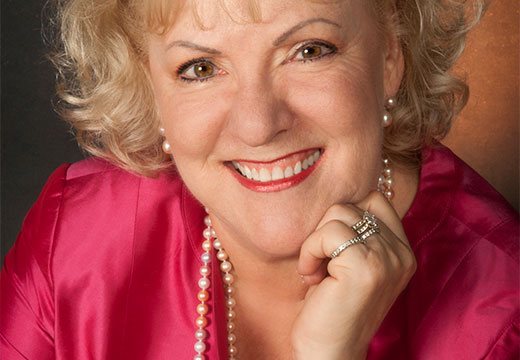
How to determine that tachycardia is caused by psychosomatic factors?
The signs of psychosomatic tachycardia are no different from the disease caused by pathological disorders in the body. However, there is one significant symptom - psychosomato-tachycardia always occurs after emotional arousal. Other signs:
- pulsation in the wrist accelerates;
- the heartbeat quickens, which every person can feel;
- blood pressure rises;
- heart rate changes even with slight anxiety or excitement;
- most often tachycardia manifests itself in the morning and evening;
- against the background of emotions, the perception of reality is disrupted;
- trembling of limbs;
- a surge of heat or, conversely, cold;
- when talking about any problem, the patient nervously gestures with his hands, since with psychosomatic manifestations there is always nervous overexcitation;
- sleep is disturbed;
- dizzy;
- the patient experiences increased fatigue as the nervous system is exhausted;
- mental performance decreases;
- depression develops;
- mood changes frequently;
- I want to sleep during the day;
- memory deteriorates;
- indifference to everything around appears;
- the patient cannot control himself;
- paranoia develops.
These symptoms increase gradually. Feature - psychosomatic palpitations cannot be normalized with the help of antiarrhythmic drugs. The rhythm is restored only after calming down.
Opinion about the connection between the emotional state and diarrhea of famous psychologists
The psychogenic form of diarrhea is considered by famous psychologists as a complex of problems unresolved by the patient. The basis of the disease, according to doctors, is a reluctance to accept oneself as a person, to absorb new sensations or emotions, and an obsession with past experiences.
In addition, the diarrhea of a psychosomatic person, which depends on a person’s worldview, esoterically symbolizes the connection with the lower world, the person’s reluctance to constructively solve accumulated problems.
Liz Burbo
According to Liz Burbo, diarrhea develops against the background of physical, emotional and mental blockages. The patient is closed from everything and tries to reject new experiences.
Physical blockage is the reluctance to eat new or familiar foods. At the same time, the patient begins to diarrhea, and abdominal pain appears.
With emotional blocking according to Liz Burbo, the patient denies any innovations, even if they would be useful to him. He does it hastily, without having time to appreciate the benefits of the new experience. As a result, the ability to rejoice and be surprised is dulled.
The sense of danger and guilt in such a patient is extremely developed. If he senses the slightest sign of danger, he will do everything possible to protect himself.
When mentally blocked, the patient underestimates himself. Believes that he does not deserve better for himself. This creates a feeling of fear.
Louise Hay
The key idea of the American psychoanalyst is that our destructive thoughts are the root cause of various diseases. Using self-hypnosis techniques, it is possible to heal yourself and prevent relapses of pathological processes.
According to Louise Hay, diarrhea is the body’s response to deeply hidden fears. The patient denies everything good and bad, new experiences and new acquaintances.
A person wants to escape from life. This is a form of fear. And the toilet is a stable and quiet refuge, into which it is impossible for an aggressive environment to enter.
Getting rid of diarrhea according to Louise Hay is possible only by convincing yourself that all processes of absorption and removal of waste residues are proceeding normally. The patient must accept the fact that even in an aggressive environment, one can live in peace and harmony with oneself.
In the books of Louise Hay, Liz Burbo, and other apologists of psychology, the psychological causes of the pathological process are described for each disease, including bacterial origin.
Whether to trust the opinion of psychologists or not, everyone decides for themselves. But diarrhea is a symptom of many different diseases, often not associated with eating poor quality food. You should conduct a thorough examination, and only then contact a psychotherapist.

You are probably also familiar with the situation when the stool becomes liquid, and at the same time there is a frequent urge to have a bowel movement. Many people try to be treated with medication, but this only gives a temporary effect. There are reasons that lie in the psyche. So we’ll talk about them, why the psychosomatics of diarrhea (diarrhea) occurs.
It is interesting that diarrhea is not so much an independent disease as a beacon showing that the body has certain disruptions in the functioning of the gastrointestinal tract. But even more often, diarrhea develops due to nervousness.
Diarrhea is often accompanied by symptoms such as:
- discomfort in the stomach,
- constant rumbling
- flatulence,
- constant urge to go to the toilet.
When it occurs, the gastrointestinal tract malfunctions and the work of intestinal processes accelerates to a very high level. As a result, he strives to get rid of the contents as soon as possible.
Common causes of diarrhea from the body are:
- rotavirus infections,
- food poisoning,
- chronic disorders of the gastrointestinal tract,
- chemical poisoning,
- taking medications and others.
But at the same time, there are also psychological causes of diarrhea.
Authors such as Louise Hay and Liz Burbo worked on identifying these reasons and compiling special tables. I will express my vision.
Ways to heal from heart pain due to nervousness
In fact, there is only one way to heal from heart pain. This path was hinted at or openly indicated by all of the listed psychological reasons.
This path is the opening of the heart of Love. Love for yourself, for loved ones, for people around you, for Life, for the World, etc. True, unconditional love.
How could it be otherwise if the heart is called to be a container of Love, and in its absence the heart begins to ache. This means we need to bring Love back, because it was once there.
A person is born with Love in his heart. He just begins to lose it in parts from early childhood, “thanks” to family scenes full of hatred and contempt and the indifferent or cruel attitude of loved ones.
What to do now? If you are an adult, then look for ways to return Love, restore it in full in your heart or in the heart of your child (if we are talking about your sick child).
How? If we are talking about your heart, then confess your love to yourself, and with all seriousness: You are a particle of the Creator, unique, the only one in the whole world. As a son (daughter) of the Creator God, every person has the right to be loved. And first of all, be loved by yourself. Otherwise, there is no way: how can you love another person (your neighbor) if a person does not know what it is to love (starting with himself) and who will love a person if he does not love himself?
True Love originates in your heart and spreads around. True Love brings only Joy and Goodness, both to the person himself and to those around him. Because if the heart is filled with Love, then a person has no time to experience negative emotions. He lives, enjoying every moment. He feels only GRATITUDE for everything that Life gives him (and for the trials that make a person stronger, and for happy moments).
So, if you want to have a healthy heart, return Love and Kindness to your heart.
Lada
Psychosomatics of tachycardia
- 1 What is psychosomatics?
- 2 Psychosomatic causes of tachycardia
- 3 Elimination of psychosomatic causes of the disease
There is a relationship between the psychological state of the human body and the appearance of tachycardia. The signs and development of diseases that appear against the background of neurotic disorders are studied by psychosomatics. Psychosomatics of tachycardia determines the mental or psychological causes of the development of rapid heartbeat and is aimed at eliminating these causes.
What is psychosomatics?
Psychosomatics is a special branch of medicine that studies the effect of psychological factors and nervous disorders on the human body. Psychoneuroses are not the only causes of tachycardia, but are the foundation for the development of the disease. In the presence of psychological pathology, the disease develops rapidly and its elimination becomes more difficult. There is a predisposition to the development of tachycardia of a psychosomatic nature. The reasons for this predisposition to psychosomatics are as follows:
on
- difficult pregnancy;
- illnesses of close relatives;
- position in society;
- difficult adaptation to the outside world.
A child from a dysfunctional family adapts faster to the environment than a child with endless family care.
Strong emotions affect the heart and the human body as a whole.
Psychosomatics studies the effect on the human body of stressful situations that expose it to emotional stress and psychological trauma. There is a relationship between an angry, anxious state and the normal functioning of the heart muscle. The heart reacts to stress in different ways: it slows down the heart rate with bradycardia and increases it with tachycardia. A person’s encounter with various internal and external factors is characterized by positive and negative emotions, which help the body build immunity and resist neurotic and psychological disorders.
Return to contents
Psychosomatic causes of tachycardia
Cardiovascular diseases occur against the background of deep feelings, awareness of guilt or uselessness. The main psychosomatic causes of tachycardia are presented in the table:
Cause
Manifestation
| Committing an unpleasant act and realizing guilt | Prolonged restlessness or severe anxiety appears. The experience disrupts sleep, and the heart rate slows or increases. A prolonged nervous state leads to tachycardia. |
| Excessive pity for yourself or people | There is an increase in anxiety, all surrounding events cause sadness and sadness. Cardiac pathology begins to develop. |
| Constant rush | A rapid change in the rhythm of life is characterized by an equally rapid change in mood, moral difficulties arise, and daily negative emotions appear. The nervous system cannot withstand the load and fails. |
| Expressed aggression | Caused by emotional instability and the presence of various phobias. The desire to assert oneself leads to constant stress. |
If your heart hurts due to nervous tension, it is recommended to take Corvalol.
Return to contents
Elimination of psychosomatic causes of disease
To prevent the development of tachycardia, it is necessary to eliminate the sources of the disease and normalize the mental state. To change the psychological state and emotional state, the following comprehensive approach is used:
- You should not use the following phrases in conversation:
- "I'm sorry";
- “I am a compassionate person”;
- “I have compassion for everyone”;
- “the heart bleeds”;
- "I don't want to live."
- Don't let negative feelings and emotions take over.
- Control your mood in unfavorable situations.
- Learn to forgive yourself and the people around you.
- Be able to sincerely apologize.
- Don't get angry or agitated for minor reasons.
To eliminate the psychosomatics of cardiovascular diseases, it is recommended to use gymnastics, yoga, dancing, massage, walks in the fresh air, communication and friendship with interesting and positive people. The psychosomatics of tachycardia are beneficially influenced by the positive mood of the body and a positive emotional background, which helps to normalize the heart rate for a long time.
on
A comment
Nickname
How to program yourself for recovery?
The best way to program yourself for recovery is to tune in to a positive “wave”. This is exactly what Louise Hay was talking about. To do this, follow these instructions:
- As soon as you open your eyes in the morning, think about pleasant events for you, be glad that you live on this earth, you do not have any restrictions compared to people with disabilities.
- Consider each situation not as a defeat, but as a small victory. After all, you have gained some experience.
- Forgive those who offended you.
- Spend more time with positive people.
- Play sports, go out with friends.
- Give your body proper rest and sleep, do not overload it with mental and physical work.
- Enjoy every day and smile more.
- To cheer you up, watch comedies, humorous programs and anything that can cheer you up.
If you can’t do anything on your own, go to a psychologist - he will definitely help solve your psychological problems.
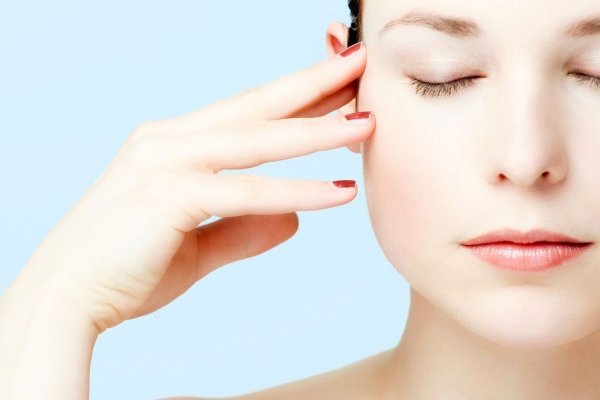
How to cope with psychosomatics faster?
Two points are important: getting to the exact cause and choosing the right psychological techniques. If you break down all the work into stages, then it would be more advisable to go this way:
- determine the initial situation,
- specify the root emotion (anger, guilt, shame, grief - each has its own),
- select appropriate psychological techniques,
- check the correctness of their implementation,
- adjust the emotion (develop new reactions to provocations).
Example : you can read for a long time about constipation - that these are mental blocks, dislike for yourself. But in 95% of cases it appears in a state of choice, in limbo. If you have basic mistrust and anxiety, constipation becomes chronic and worsens during the period of choice.
Consequently, situations with choice will never end, but the attitude towards them can be changed using psychotherapeutic methods.
What do the majority do?
They study the theory, but do not achieve improvement.
The fact is that working independently with your unconscious requires a lot of preparation.
Do you need a specialist?
It will just be faster with him. It’s possible to cope on your own, but only a few can do it and it takes a long time.
In my practice, the time frame varied from 1 consultation to a year. The most common cases are:
- headache,
- Gastrointestinal tract,
- gynecological problems,
- lungs,
- childhood illnesses through parents and others.
You can find out about working with me here.
In the development of psychosomatic diseases, the main provoking factor is considered to be psychological.
And it’s not without reason that their characteristic symptoms are similar to those of somatic diseases:
- often feel dizzy;
- there is a feeling of general malaise, fatigue;
- body temperature rises, etc.
Often, problems of a psychosomatic nature are manifested by stomach ulcers, high blood pressure, and vegetative-vascular dystonia.
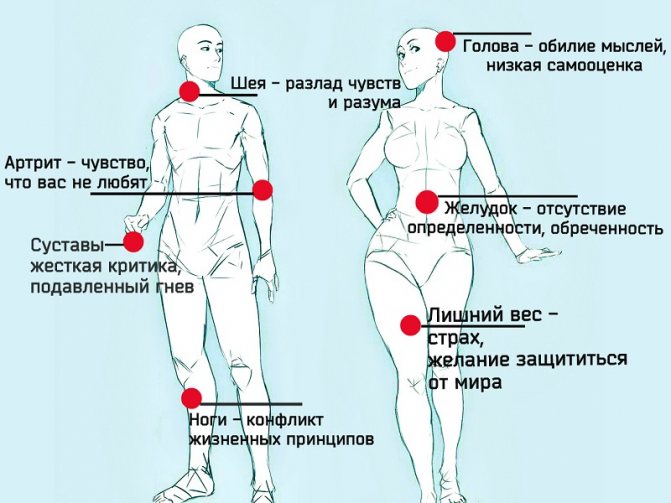
Causes of emotional illnesses
Most diseases are related to what a person thinks and feels. You should pay attention to the main problems caused by the emotional component:
- Any diseases related to the nose. This is most typical for people who feel insecure, demand attention, harbor resentment or dissatisfaction with desires.
- Liver problems appear if a person feels angry at the environment, feels resentful, blames himself for his past misdeeds and refuses to accept what is happening as it is.
- Arthritis most often occurs in those who are prone to self-criticism. They lack love, are afraid to come out of their shell, and are afraid of significant changes in the future.
- Skin problems are most common among people who are angry with themselves, cannot accept their shortcomings, and are afraid to get close to others.
- Constant headaches are common to those who are too critical of themselves. These people feel inferior, believe they are not doing enough work, or cannot achieve academic success despite their efforts.
- The kidneys begin to hurt due to resentment, frustration, and boredom.
- Oncological diseases tend to appear in those people who reproach themselves for certain actions. They think they could do better. The difference between reality and expectations causes illness.
Due to prolonged stress, pain, and resentment, the following symptoms appear:
- changes in blood glucose levels, which may cause diabetes in the future;
- shortness of breath and pain in the lungs;
- incessant headaches, migraines, heaviness in the head, inability to collect thoughts;
- pain in the back and neck;
- sudden changes in blood pressure;
- problems with the digestive system, stomach pain, difficulty visiting the restroom.
A long time ago, diseases that were caused by psychosomatics were identified. Among them are the following:
- the appearance of stomach ulcers, constipation;
- hypertension;
- asthma;
- dermatological diseases;
- diabetes caused by high blood glucose levels;
- ulcerative colitis;
- arthritis.
Now scientists have added to this list. Now the following pathological manifestations are classified as psychosomatic:
- caries and other oral problems;
- tendency to take narcotic substances;
- alcoholism;
- problems in intimate life;
- infertility or complicated pregnancy;
- menstrual irregularities.
Complete table according to Sinelnikov
Allergies – lack of confidence in one’s own strength, stress, feelings of fear.
Apathy is resistance to feelings, fear, suppression of one’s self, indifferent attitude of others.
Apoplexy, seizure - flight from family, from oneself, from life.
Appendicitis - fear of life.
Arthritis, gout - lack of love from others, increased criticism of oneself, feelings of resentment, indignation, anger.
Asthma – suffocating love, suppression of feelings, fear of life, evil eye.
Insomnia – fear, guilt, mistrust.
Rabies, hydrophobia – anger, aggression.
Eye diseases - anger, frustration.
Stomach diseases are a fear.
Dental disease – lingering indecision, inability to make a clear decision.
Leg diseases - fear of the future, fear of being unrecognized, fixation on childhood traumas.
Diseases of the nose - resentment, crying, a feeling of insignificance, it seems to you that no one notices or takes you seriously, the need for someone's help.
Liver disease – anger, chronic resentment, self-justification, constant bad mood.
Kidney disease - boredom, anger at yourself, self-criticism, lack of emotions, disappointment, annoyance, failure, failure, mistake, failure, inability, reacting like a small child, self-criticism, losing.
Back problems - lack of emotional support, lack of love, guilt, fear generated by lack of money.
Sore knees - pride, selfishness, fear.
Sores, wounds, ulcers - hidden anger.
Warts – belief in one’s own ugliness, evil eye, envy.
Bronchitis - disputes, swearing in the family, tense atmosphere in the house.
Varicose veins – loss of strength, overwork, overload.
Sexually transmitted diseases - mistreating other people, believing that sex is a dirty business.
Excess weight – fear, need for protection, self-denial.
Gray hair - stress, worries, overwork.
Hemorrhoids are a worry about the past.
Hepatitis – fear, anger, hatred.
Herpes – a feeling of guilt for your thoughts about sex, shame, expectation of punishment from Above.
Gynecological diseases - reluctance to be a woman, dislike for oneself, rude, inattentive attitude of men.
Deafness – unwillingness to listen to others, stubbornness.
Pus, inflammation - thoughts of revenge, worry about the harm caused, a feeling of remorse.
Headaches - fear, self-criticism, feeling of inferiority.
Depression – anger, hopelessness, envy.
Diabetes – jealousy, the desire to control the lives of other people.
Diarrhea, diarrhea - fear.
Dysentery – fear, strong anger.
Bad breath – gossip, dirty thoughts.
Jaundice – envy, jealousy.
Gallstones – bitterness, heavy thoughts, pride.
Constipation – conservatism in thoughts.
Goiter, thyroid – a feeling of hatred because you have been hurt, suffering, excessive sacrifice, a feeling that your path in life is being blocked.
Itching – remorse, repentance, impossible desires.
Heartburn – fear, severe fear.
Impotence – fear of being ineffective in bed, excessive tension, feelings of guilt, anger at the previous partner, fear of the mother.
Treatment methods from the perspective of psychosomatics
If traditional treatment methods do not help get rid of arrhythmia, and the disease does not leave a person alone, then you can be sure that the cause lies in psychosomatics.
Arrhythmia caused by nerves can be cured using the following methods:
- Breathing exercises. Relaxing deep breathing will help cope with stress and make your heart rate less frequent.
- For psychosomatic arrhythmia, music therapy helps to relax. Calm, soothing music can have a positive effect on the nervous system.
- Also, with this disease, it is recommended to reconsider your diet. Fatty foods rich in cholesterol should be excluded from it. Preference should be given to fruits and foods rich in proteins.
- You can try acupuncture as an alternative treatment.
In addition to the methods described above, the doctor may advise getting rid of neurological arrhythmia using folk remedies.
One of the most effective, positively influencing the elimination of psychosomatic causes of illness, is a decoction of various herbs. To prepare it, you need to mix sage, cudweed, hawthorn, motherwort and oregano in proportions 1:2:1:2:2. The finished mixture should not exceed one tablespoon in quantity. Next, it should be poured with boiling water in an amount of 200 ml, then the broth should be heated in a water bath for up to 15 minutes, set aside and let it brew for at least 20 minutes. You need to drink the resulting composition for one and a half months, half a glass twice a day.
If the illness is accompanied by insomnia, then another herbal mixture can help. To make a healing decoction, you need to mix lemon balm, yarrow and valerian in proportions 3:3:4. You will get two large spoons of the mixture, which need to be poured with 200 ml of boiling water. The resulting composition needs to brew for 12-15 minutes, then it is filtered, and it can be taken three times a day, 1/3 cup.
Psychosomatics and arrhythmia
The autonomic nervous system plays an important role in the functioning of heart rhythms. Decades of research have contributed to a better understanding of the anatomy and physiology of the nervous system, confirming the relationship between arrhythmia and psychosomatics.
As early as 1628, William Harvey hinted at the connection between the brain and the heart when he wrote, “every affection of the mind, that is attended either by pain or pleasure, by hope or fear, is a cause of emotion, whose influence extends to the heart.” Over the past half century, numerous anatomical and physiological studies of the cardiac autonomic nervous system (ANS) have shown that autonomic activation contributes to changes in heart rate.
Psychosomatics of arrhythmia
Arrhythmia is a condition that can occur due to smoking, drinking alcohol, stress, or excessive exercise. Arrhythmia can also occur spontaneously, without any reason. There are several names for different conditions associated with irregular heartbeats: bradycardia (slow heartbeat), tachycardia (fast heartbeat), and arrhythmia (usually an irregular heart rhythm). Arrhythmia does not always require treatment. If your arrhythmia is causing risks to your health, treatment with lifestyle changes and a better understanding of the condition may help.

Tips for treating nervous arrhythmia:
1. Risk factor management. Lifestyle factors such as high stress or frequent outbursts of anger significantly contribute to the development of arrhythmia. Low potassium levels and low calcium intake are also associated with premature beats. To treat arrhythmia, let's look at what preventive measures you can take to take care of yourself.
- Regular physical activity can significantly reduce stress levels and help with mood regulation.
- Find a healthy outlet for your negative emotions and feelings in the form of therapeutic procedures.
2. Don't put off until tomorrow what you can do today. Because arrhythmia is not always obvious, it can be difficult for others to understand what you are going through. There are support groups for arrhythmia and other chronic illnesses that may be helpful for you. Follow your doctor's recommendations, and remember that treatment is a long-term course.
The following tips will help prevent heart diseases that arise from nervousness:
- Try to manage stress and anxiety, both of which can cause your body to respond by "natural selection" and increase your heart rate. Use deep, relaxing breathing to slow your heart rate, manage stress, and quell anxiety.
- Continue to research and look for more information about your condition.
- Keep in touch with your doctor, and don't hesitate to ask questions about symptoms you may experience.
- If you have questions about your treatment, be sure to ask your doctor.
3. Music for arrhythmia. Music can have a psychosomatic effect on patients with nerve diseases. Calm, neutral music can have a positive effect on the functioning of the autonomic system. 4.Check your pulse. If you suspect you may have an arrhythmia, or if you have been diagnosed and simply want to be aware of how it affects you, learn to monitor your heart rate. There are a wide variety of heart monitors and apps available for purchase, but it's also easy to make your own.
- Feel the space between your second and third fingers of your right hand on your left wrist. Feel your pulse.
- Using the same fingers, press on the soft tissue of the side of the neck under the jaw. You should feel your heart beating through the blood vessels you find there. Move your fingers around, pressing gently but firmly until you find the pulse.
- There is no need to count how many times your heart beats. You check your heart rhythm with your pulse, not your heartbeat.
- Stethoscopes are inexpensive instruments that help monitor your heart rate. You can find them for sale in pharmacies and many other retail outlets.
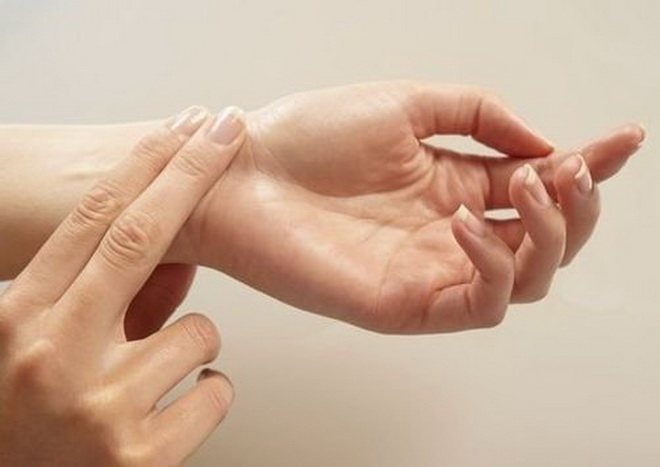
5. Eat healthy. A healthy diet includes plenty of fresh fruits and vegetables and lean protein (chicken, fish and legumes). Fatty foods should be avoided, including saturated fat, trans fat and cholesterol. Recommended food includes the following products:
- Foods rich in potassium such as bananas, apricots, oranges, sweet potatoes, beets, zucchini and avocados.
- Green, leafy vegetables such as kale, collards, spinach and parsley are part of a healthy diet as they are rich in vitamin K.
- Limit your salt intake as it may increase your blood pressure.
Tachycardia is often confused with nervous arrhythmia. But there is still a difference. And this can be seen from the symptoms listed below.
Symptoms of tachycardia
(Sometimes there are no symptoms)
- Dyspnea;
- Dizziness;
- Syncope (fainting);
- Fluttering in the chest;
- Sudden weakness.

Symptoms of neurological arrhythmia
- Excessive emotionality;
- The patient feels as if his pulse disappears for half an hour;
- The person is too afraid for his health and life.
Basic moments
- Many types of arrhythmias are harmless, but some of them can lead to deterioration of health without proper treatment.
- Acupuncture and certain supplements may help treat arrhythmia.
- You should discuss any alternative or complementary treatments with your doctor.
Arrhythmia is an abnormal or irregular heartbeat. If the heart beats too slowly it is called bradycardia, and if the heart beats too fast it is called tachycardia. Most cardiac arrhythmias are harmless and do not require treatment. Some arrhythmias are more serious and even life-threatening, especially if you have several of them. When the heart beats incorrectly, it disrupts blood flow. This can cause damage to the heart, brain, or other organs.
If you have an arrhythmia, you may want to try alternative treatments in addition to your doctor's treatment plan. Always discuss any alternative or complementary treatments with your doctor because some can be harmful if used incorrectly.
Acupuncture is an effective alternative treatment
An analysis of a number of studies shows that 87 to 100 percent of study participants experienced normal heart rate function after using acupuncture. However, the review found that more research and clinical trials are needed.
Electrophysiologists suggest that acupuncture may help prevent abnormal heart rhythms after cardioversion for atrial fibrillation. This procedure restores the heart's rhythm, either with chemicals or electricity.
What you should know! Acupuncture as an ancient Chinese treatment method has some promising results in the treatment of atrial fibrillation, but to date there is not enough research to strongly recommend such treatment.
Treatment methods from the perspective of psychosomatics
For treatment, you must first be diagnosed by a cardiologist. If diseases of the cardiovascular system are detected, he will prescribe medications. After which you need to visit a psychologist.
During psychotherapy sessions, you will learn to manage your emotions and change your attitude towards yourself and the world. A psychologist will help determine the exact causes of psychosomatics and draw up a treatment plan.
To stabilize the state, you need to know and accept yourself, allow yourself to be yourself. What else:
- learn self-regulation, avoid mood swings;
- broaden your horizons, stop seeing the world in black and white (consider victories as the key to new perspectives, and failures as invaluable experience and an opportunity for self-development);
- give up what interferes with your development, part with the past;
- be open to new things, look for new means of achieving goals;
- reconsider your views on the world, try to keep up with the times and the society in which you live;
- increase stress resistance;
- regain your sense of confidence and security.
Instability in life simply reflects internal contradiction. Know yourself, get to know your temperament, character, abilities, needs, interests, etc. Determine your value and belief system. When everything in a person is harmonious and unified, then his condition is stable, regardless of situations.
To relieve emotional and physical stress, it is recommended to exercise regularly, find something you love, and give preference to active recreation. Meditation, breathing exercises, aromatherapy, acupuncture, music therapy, and herbal teas are also useful.
According to Liz Burbo, arrhythmia is the result of a person taking everything to heart. It also signals that a person has forgotten about his needs and is trying to please others and earn their love. To heal, you need to love yourself and eliminate dependence on other people. Liz Burbo advises telling yourself at least 10 compliments every day. This will help build self-love and self-respect.
Blood symbolizes the soul (joy and strength). The heart is the center of life, a reflection of a person’s harmony with himself and the world. Any disturbances in the functioning of the heart indicate an unsatisfied need for love. The reason is old grievances, jealousy, fear of loneliness, pity and regret, worries about oneself and others, concentration on one’s own and other people’s problems.
Solution: be open to the world, cultivate mercy, but not compassion, love yourself and other people. You need to understand your purpose and role in the world. Rhythm disturbances are an indicator that you are living according to someone else’s scenario, that you have lost your rhythm of life. Get back on your path.
Sinus tachycardia: causes, symptoms and signs, how and when to treat
Have you been struggling with HYPERTENSION for many years without success?
Head of the Institute: “You will be amazed at how easy it is to cure hypertension by taking it every day...
Read more "
Sinus tachycardia is considered a fairly common type of arrhythmia when the pulse exceeds 100 beats per minute. It can be a variant of the norm or serve as a sign of pathology of the heart, blood vessels, endocrine system and other organs.
Each of us is familiar with the feeling of a rapid heartbeat, which appears during excitement, physical effort, after a cup of strong coffee or a hearty meal. In a healthy body, such a reflection of external conditions or emotional reactions that are not always favorable is considered a variant of the norm, because after a short time the heart itself restores the correct rhythm without disturbing the blood flow in the organs.
Tachycardia is considered physiological if it accompanies emotional experiences, physical activity, lack of oxygen, or being in a stuffy or hot room. In children under 7 years of age, a rapid pulse is considered normal even at rest.
In fact, tachycardia in a healthy person is a compensatory mechanism designed to enhance the work of the heart to provide blood to tissues when they need it more than usual. Activation of the sympathetic nervous system and the release of adrenal medulla hormones into the blood provide an increased heart rate, and when external conditions normalize, it quickly returns to normal.
However, tachycardia is not always temporary and harmless. It often accompanies serious diseases of the heart, thyroid gland, and brain, so it should not be ignored. Timely diagnosis and search for the cause of unexplained tachycardia is the key to successful treatment and prevention of serious complications.
Causes and types of sinus tachycardia
The term “sinus” means that the impulses to contract the heart come as expected - from the main node, the sinus, so the rhythm remains regular, and the atria and ventricles contract at the same frequency. The arrhythmia increases gradually and in some cases the pulse reaches 220 per minute (usually within 110-120 beats/min).
Depending on the reason, there are:
- Pathological sinus tachycardia;
- Physiological tachycardia.
Physiological tachycardia, as mentioned above, is the norm, that is, the body’s adaptation to changed external conditions. This is an adequate response to adversity, which is not accompanied by hemodynamic disorders and myocardial changes due to its short duration. It is dangerous when tachycardia acquires pathological features or complicates another pathology.
Pathological sinus tachycardia accompanies a number of diseases and inevitably leads to changes in the heart and systemic blood flow. Working at high speed and actually wearing out, the heart cannot cope with delivering the required volume of blood to the large and small circles, since with rapid contraction its chambers are not completely filled. Over time, cardiomyopathy develops, the heart expands, myocardial contractility decreases, and the organs do not receive enough nutrition.
Against the background of pathological tachycardia, myocardial ischemia progresses due to a lack of blood flow in the coronary arteries, and if the latter are also affected by atherosclerosis, then deterioration of the condition and even a heart attack can occur very quickly.
The causes of sinus tachycardia can be divided into cardiac, that is, associated with changes in the heart itself, and extracardiac, which are disorders of other organs.
Why do you feed pharmacies if hypertension is afraid of the usual like fire...
Tabakov has revealed a unique remedy against hypertension! To reduce blood pressure while preserving blood vessels, add to…
Cardiac causes of sinus tachycardia:
- Heart failure, both acute and chronic;
- Inflammatory processes in the heart muscle - myocardium of an infectious, autoimmune nature; inflammation of the inner layer of the heart (endocardium) and outer layer (pericardium);
- Various forms of coronary heart disease - heart attack, angina, cardiosclerosis;
- Defects, congenital and acquired;
- Cardiomyopathies.
Of the non-cardiac causes, tachycardia is most often provoked by endocrine disorders and neurogenic disorders. Neurogenic sinus tachycardia is becoming increasingly common due to increasing levels of stress in the population. This type of rhythm disturbance is very characteristic of neuroses, vegetative-vascular dystonia, psychoses and is usually diagnosed in young and emotionally labile subjects.
Among endocrine disorders, sinus tachycardia can be caused by increased function of the thyroid gland (thyrotoxicosis) and hormone-producing tumors of the adrenal glands. With blood loss, severe anemia, severe pain, increased body temperature due to infections, tachycardia also often develops.
Hypoxia provokes activation of the sinus node and, accordingly, increased heart rate. This occurs with lung diseases (emphysema, chronic bronchitis, asthma), and with anemia, and with a lack of oxygen in the inhaled air.
When taking certain medications, drug-induced sinus tachycardia develops. It can be caused by diuretics, hormonal drugs, antihypertensive drugs, aminophylline, adrenergic agonists, antidepressants, and caffeine-containing drugs.
Thus, according to the cause, pathological sinus tachycardia can be drug-induced, neurogenic, toxic, hypoxic, or cardiac.
Sinus tachycardia can occur during pregnancy even in women without previous pathology of the circulatory system. This phenomenon is not considered a variant of the norm, but has natural prerequisites:
- Increased peripheral blood flow due to the growth of the uterus and fetus in it;
- A woman's weight gain during pregnancy;
- Features of hormonal levels;
- An increase in pressure inside the abdominal cavity due to an enlarged uterus, which seems to press the diaphragm from below, as a result of which the position of the heart in the chest cavity may change.
As pregnancy progresses, the heart experiences increasing stress, so in the last trimester tachycardia can become severe. Rhythm disturbances in pregnant women require close attention and correction due to the risk of disruption of fetal development and the course of gestation and childbirth itself.
Manifestations of sinus tachycardia
The severity of clinical manifestations and subjective sensations of the patient depend on the degree of tachycardia, the nature of the underlying pathology, the presence or absence of damage to the heart muscle, valves, and blood vessels.
Some patients may have no complaints at all or may note slight discomfort in the chest, palpitations, periodic pain in the heart, which do not have a significant impact on lifestyle and work activity.
In other cases, the symptoms become so obvious and unpleasant that the patient can neither work nor perform usual household chores. Appears:
- Persistent and clearly noticeable heartbeat;
- Feeling that there is not enough air, shortness of breath even at rest;
- Weakness, fatigue during low-intensity physical activity;
- Dizziness and even episodes of loss of consciousness;
- Heart pain is a common symptom in patients with chronic myocardial ischemia, when arrhythmia further impedes blood flow through the coronary arteries;
- Anxiety, insomnia, emotional lability, irritability.
If a patient with tachycardia has coronary arteries affected by atherosclerosis, then an attack of arrhythmia will provoke an even greater lack of oxygen, and angina pectoris will become a characteristic symptom. Typically, heart pain lasts no more than five minutes, during which the patient himself takes nitroglycerin to relieve pain.
Unlike paroxysmal tachycardia, which is characterized by a sudden onset and an equally sudden end, an attack of sinus tachycardia develops gradually, so the patient cannot indicate the exact time of its occurrence.
When a high pulse number is reached, the feeling of heartbeat becomes clear, which some patients refer to as “fluttering” in the chest. The heart, working in intensive mode, cannot cope with delivering the required volume of blood to the internal organs, which is associated with fainting, dizziness and even neurological symptoms, convulsions with a significant lack of blood supply to the brain. Old age and concomitant atherosclerosis of the cerebral arteries aggravate cerebral symptoms.
With a prolonged attack of sinus tachycardia with high pulse numbers, the patient may become pale, restless, the amount of urine excreted decreases, and blood pressure decreases.
In the neurogenic form of the pathology, symptoms will include emotional lability, irritability, sleep disorders, and panic attacks. Especially often, sinus tachycardia against the background of psycho-emotional abnormalities occurs in young women who are acutely experiencing even not very stressful situations.
Sinus tachycardia in thyrotoxicosis can bother patients not only during the day, but also at night, although it is known that at night, under the influence of the activity of the vagus nerve, the pulse slows down somewhat. Of course, sleep in such patients will most likely be disturbed, followed by irritability and fatigue.
In a child, sinus tachycardia can be recorded with fever, which accompanies a variety of infections, especially in children in the first years of life. Lack of maturity of the autonomic nervous system, congenital heart defects and disorders of brain development can also lead to attacks of palpitations.
With fever, for every degree of temperature rise, up to 10-15 heart contractions are added, so if a child with a high temperature due to respiratory infections, the mother notes a rapid heartbeat and rapid breathing (but free, without obstruction!) - most likely they are caused by fever and intoxication and will go away on their own as the temperature drops.
It is important to assess a baby’s pulse in accordance with his age. In newborns, it can reach 120-140 per minute, which is not considered a sign of sinus tachycardia, and every mother knows about such a frequent beating of a small heart. A frequent pulse up to the age of seven is a physiological phenomenon, but its increase by more than 10% of the age norm is a sign of sinus tachycardia.
Table: heart rate norms by age
Age
Limits of normal values (bpm)
| newborns (up to 1 month of life) | 110-170 |
| from 1 month to 1 year | 100-160 |
| from 1 year to 2 years | 95-155 |
| 2-4 years | 90-140 |
| 4-6 years | 85-125 |
| 6-8 years | 78-118 |
| 8-10 years | 70-110 |
| 10-12 years | 60-100 |
| 12-15 years | 55-95 |
| 15-50 years | 60-80 |
| 50-60 years | 65-85 |
| 60-80 years | 70-90 |
In adolescents, sinus tachycardia is usually neurogenic in nature and develops in emotionally labile subjects with autonomic dysfunction. Any experience can cause them to experience palpitations, weakness, anxiety, coupled with various signs of impaired tone of the autonomic nervous system - sweating, excessive urination, trembling, dizziness. As a rule, these symptoms appear as the main complaints of adolescents and their parents.
With age, as the brain matures and autonomic regulation, the symptoms of sinus tachycardia may weaken or disappear completely, but if they are ignored and due attention is not paid to the peculiarities of emotional reactions to external events, tachycardia can persist, appearing periodically even with the most minor nervous experiences, lack of sleep, stress during study.
Complications arise from pathological tachycardia with frequent and prolonged attacks. The chambers of the heart gradually expand, the myocardium weakens, and signs of stagnation appear in the blood circulation. Possible acute circulatory failure in the form of pulmonary edema, chronic congestive heart failure with involvement of internal organs, acute disturbance of coronary blood flow with myocardial infarction, progressive angina. Acute and chronic heart failure are the most common causes of death in patients with arrhythmias.
Diagnosis and treatment of sinus tachycardia
The diagnosis of sinus tachycardia is made on the basis of a detailed examination of the patient. First of all, the doctor finds out the approximate time of the onset of the attack, the duration, frequency of episodes of increased rhythm, the circumstances under which the rhythm was disrupted, including the nature of the work (with harmful substances, physical overload).
A full examination aims not only to confirm the presence of sinus arrhythmia, but also to find out its cause. For this purpose, general and biochemical blood tests, urine examination, hormonal status, and, if indicated, ultrasound of the heart and other organs are prescribed.
The main place in the diagnosis of sinus arrhythmia belongs, of course, to electrocardiography - simultaneous or 24-hour monitoring.
On the ECG, signs of sinus tachycardia are:
- Increased contractions over 90 per minute;
- Preservation of regular sinus rhythm, when the P wave always precedes the ventricular complex;
- Correct QRS complex;
- Shortening the distance between the P waves;
- Increase or decrease in the height of the T waves;
- The electrical axis can be directed to the right, left (depending on the initial state of the heart), or it can be vertical (in pregnant women, young thin people).
For final confirmation of arrhythmia, for example, at the military registration and enlistment office, stress tests are carried out (squats, exercise bike, treadmill followed by ECG reading). If short-term attacks cannot be detected on a regular cardiogram, daily monitoring is carried out.
Treatment of sinus tachycardia is determined, first of all, by the root cause of the pathology. Cases of physiological TS do not require special therapy; in case of pathological arrhythmia, treatment is prescribed by a cardiologist together with specialists of other profiles (endocrinologist, psychotherapist, neurologist).
If sinus tachycardia is diagnosed, then the first step is to reconsider your regimen, nutrition and lifestyle. In many cases, general measures can significantly improve your well-being and reduce your heart rate. A patient with sinus tachycardia should:
- Stop smoking and drinking alcohol;
- Avoid coffee, caffeine-containing drinks, chocolate, strong tea, avoid too hot, spicy foods in favor of vegetables, fruits, and herbs;
- Do not overeat, eat food in 5-6 meals and in small volumes;
- Ensure adequate and sufficiently long sleep;
- Walk outdoors more often, take walks and exercise within reasonable limits;
- Avoid stress, traumatic situations, physical overexertion (at work and in the gym).
With physiological sinus tachycardia, the measures listed above are usually sufficient to normalize the heart rhythm.
If arrhythmia is a complication of another disease, then treatment should be aimed at it first, otherwise attempts to reduce the pulse only with antiarrhythmic drugs can adversely affect the heart muscle, lead to circulatory failure and worsening arrhythmia. If sinus tachycardia is associated with increased thyroid function, then thyreostatics (Mercazolil) are prescribed, and beta-blockers (pindolol, oxprenolol) can be added to correct the rhythm. If beta blockers are contraindicated for any reason, then calcium antagonists (verapamil, diltiazem) can be used.
For sinus tachycardia due to anemia, the administration of iron supplements (ferrum-lek), as well as vitamins and microelements, is indicated. Antiarrhythmic drugs for this category of patients are prescribed very rarely.
Blood loss accompanied by tachycardia requires replenishment of the circulating blood volume (fresh frozen plasma, red blood cells, saline infusion) and, of course, stopping bleeding.
Patients with sinus tachycardia due to chronic heart failure are prescribed, in addition to beta blockers and other antiarrhythmics, cardiac glycosides (Celanide, digoxin).
The neurogenic form of sinus arrhythmia, as one of the most common, is treated by a neurologist or psychotherapist. Since its cause is stress, emotional experiences, disorders of autonomic regulation, treatment consists of prescribing tranquilizers, sedatives (Relanium, Luminal, etc.) and psychotherapy.
In addition to prescription sedatives, you can use commonly available valerian, hawthorn, motherwort, adaptol, afobazole, and various herbal teas to lower your heart rate.
Non-drug treatment of psychogenic sinus tachycardia includes physiotherapy, water treatments (swimming pool, relaxing baths), massage, that is, something that has a general calming effect. Good results come from working with a psychotherapist and mastering auto-training aimed at improving control over your emotions and mood. These measures are especially useful when, in addition to arrhythmia, the patient complains of panic attacks and fears.
In case of ineffectiveness of antiarrhythmic drugs, progression of circulatory disorders and significant deterioration of the patient’s condition, cardiologists recommend surgical treatment - radiofrequency ablation and installation of a pacemaker. The first method consists of destruction of the focus of excessive impulses, the second is indicated for life-threatening complications against the background of intractable sinus tachycardia.
Pregnant women with sinus tachycardia without cardiac pathology should remain calm, not be nervous, and refrain from physical labor. The doctor may prescribe sedatives and microelements. Many drugs are contraindicated for expectant mothers, but if tachycardia becomes severe and threatens the normal course of pregnancy, then there is no way out - antiarrhythmic drugs are used.
Prevention of rhythm disturbances such as tachycardia is of no small importance not only in the functional nature of the pathology, but also, especially in the case of existing changes in the heart itself. In the latter case, lack of rhythm control will quickly lead to an increase in heart failure with various adverse consequences.
As preventive measures, it is recommended to follow the principles of a healthy lifestyle, follow the advice on nutrition and regimen listed above (good sleep and rest, normalization of weight and nutrition, physical activity).
The prognosis for sinus tachycardia is determined by the causes of the pathology. If the arrhythmia is not associated with changes in the heart itself, but is of a functional or physiological nature, then even in the case of negative subjective symptoms it is quite satisfactory. It is much worse if the arrhythmia occurs in a patient suffering from coronary heart disease, a defect, or congestive heart failure. Such patients have a high risk of complications and therefore the prognosis is quite serious.
Video: tachycardia - how to calm the heart, “Live Healthy” program
Psychogenic arrhythmia: clinical picture and diagnostic features
There is no doubt that there is a relationship between a person’s emotional state and his heart rate. This is most clearly manifested in extreme situations, when the state of fear of death is almost always accompanied by one or another type of arrhythmia. For some people, even short-term disturbances in heart rhythm can be accompanied by panic. A state of severe stress can be caused by a sudden or repeated attack of arrhythmia. Psychogenic factors, in turn, provoke or aggravate heart rhythm disturbances.
Louise Hay's model of healing
Louise Hay used an integrated approach in the healing process, which in 1977 allowed the woman to get rid of cancer on her own. She abandoned the methods of traditional medicine and decided to put her knowledge into practice.
The treatment program includes:
- Visualization. This is what a person imagines after the outcome of the disease. He creates an image of success that constantly plays in his head. According to Louise, thoughts are material, and visualization is a way to materialize these thoughts.
- Affirmations are repeated repeated verbal attitudes, which, according to Hay, lead to the stabilization of the emotional background and put thoughts in order.
- Psychotherapy: Gestalt, cognitive behavioral approach, psychoanalysis.
- Reflexology is a branch of alternative medicine in which the main method of influencing the body is acupuncture. Representatives of this movement use a needle to target special points that have an impact on all systems of the body.
- Nutritional cleansing of the body, removal of parasites and salts. It implies a complete cleansing of the body from “slags” and “toxins”. First of all, the intestines are cleansed through plant-based diets and enemas. After which - the gallbladder and liver. Next, the stomach and pancreas can be cleaned. The cleansing course also includes getting rid of toxins in the lungs, blood, blood vessels and kidneys.
